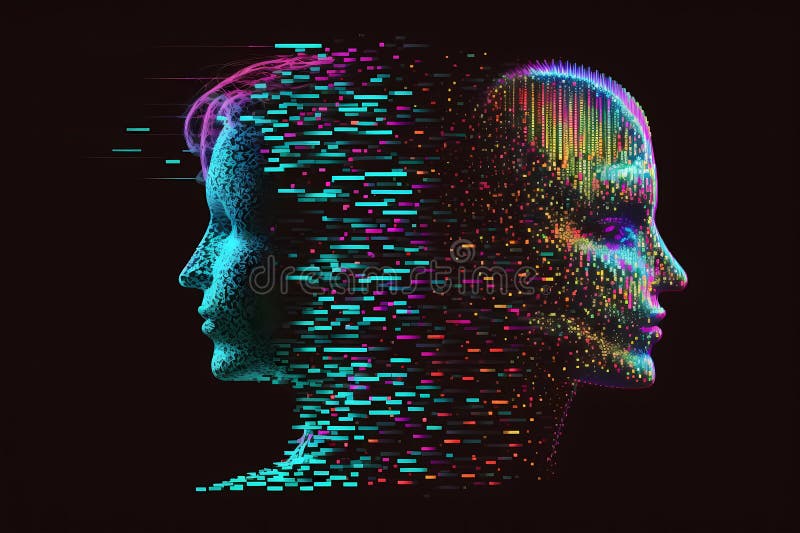The Illusion Of Intelligence: Uncovering The Reality Of AI Thinking

Table of Contents
AI's Dependence on Data: The Foundation of "Intelligence"
The Role of Big Data
AI algorithms, the heart of artificial intelligence, are heavily reliant on vast datasets for training. This "big data" approach fuels the impressive capabilities we see in areas like image recognition, natural language processing (NLP), and recommendation systems. These systems learn by identifying patterns and correlations within the data, allowing them to make predictions and decisions. However, this dependence reveals a critical limitation.
- Biased or Incomplete Datasets: If the data used to train an AI is biased – reflecting societal prejudices, for instance – the resulting AI will likely perpetuate and even amplify those biases. This can lead to unfair or discriminatory outcomes.
- "Garbage In, Garbage Out": The accuracy and reliability of an AI system are directly proportional to the quality of the data it's trained on. Inaccurate, incomplete, or misleading data will inevitably lead to flawed results, highlighting the crucial importance of data integrity.
- Environmental Impact: The immense computational power needed to process and analyze big data for AI training has a significant environmental impact, consuming vast amounts of energy and contributing to carbon emissions.
The Lack of True Understanding
It's crucial to understand that AI systems don't truly "understand" the data they process. They identify statistical patterns and correlations, allowing them to mimic intelligent behavior, but without genuine comprehension.
- Correlation vs. Causation: AI can identify correlations between variables, but it often fails to grasp the causal relationships. This can lead to incorrect inferences and flawed predictions. For example, an AI might correlate ice cream sales with drowning incidents, but this doesn't mean one causes the other (both are linked to warmer weather).
- Contextual Understanding: Current AI struggles with nuanced situations requiring common sense or contextual understanding. A system trained to identify cats in images might fail to recognize a cat partially obscured or in an unusual pose.
- Limitations in Handling Nuance: AI's ability to handle ambiguity, sarcasm, or complex emotional contexts remains limited. This restricts its application in scenarios demanding deep understanding of human communication and behavior.
The Narrow Focus of AI: Specialized, Not General, Intelligence
The Limits of Narrow AI
Most current AI systems are examples of narrow or weak AI. They excel at specific tasks, such as playing chess or translating languages, but lack the adaptability and general intelligence of humans. This contrasts sharply with the hypothetical concept of Artificial General Intelligence (AGI), which would possess human-level cognitive abilities across a wide range of domains.
- Task-Specific Expertise: AI's strength lies in its ability to master specific, well-defined tasks. However, this specialization often makes it brittle and unable to handle variations or unexpected inputs outside its training data.
- Challenges in Developing AGI: Creating AGI presents immense technical and conceptual challenges. Researchers are still grappling with fundamental questions about consciousness, cognition, and general intelligence.
The Illusion of Generalization
AI systems often struggle to generalize knowledge learned in one context to another. This lack of generalizability leads to unexpected errors or failures when presented with slightly different situations or data formats.
- Fragility in New Contexts: An AI trained to recognize handwritten digits might fail completely when presented with printed digits, even if the underlying patterns are similar. This highlights the limitations of current AI's ability to generalize.
- Difficulty in Building Robust Systems: Creating truly robust and adaptable AI systems requires overcoming significant challenges related to knowledge representation, reasoning, and learning in dynamic environments.
The Anthropomorphism of AI: Projecting Human-like Qualities
The Danger of Overestimating Capabilities
There's a tendency to anthropomorphize AI, attributing human-like consciousness, emotions, or intentions to algorithms. This is a dangerous misconception that can lead to unrealistic expectations and, in some cases, unfounded fear.
- Unrealistic Expectations: Anthropomorphism fuels unrealistic expectations about AI's capabilities, leading to disappointment when AI systems inevitably fail to meet these inflated standards.
- Ethical Implications: Projecting human qualities onto AI can blur ethical lines, especially in areas like autonomous weapons systems or AI-driven decision-making in sensitive contexts.
The Importance of Critical Thinking
It's crucial to engage critically with AI systems and their outputs, avoiding uncritical acceptance of their "intelligence." We must understand their limitations and potential biases.
- Questioning AI-Generated Content: Users should always critically evaluate information generated by AI, recognizing that it's not infallible and may reflect biases present in the training data.
- Promoting Media Literacy: Improving media literacy regarding AI-generated information is crucial to avoid misinformation and manipulation.
Conclusion
In summary, while AI is a powerful tool with transformative potential, it's important to recognize the illusion of intelligence. AI's dependence on data, its narrow focus, and the dangers of anthropomorphism highlight its limitations. AI excels at specific tasks but currently lacks the general intelligence, contextual understanding, and adaptability of human beings. Understanding the limitations of current AI, by recognizing the illusion of intelligence, is critical for responsible technological development and deployment. Continue learning about the realities of AI thinking to make informed decisions in our increasingly AI-driven world.

Featured Posts
-
 Open Thread Your February 16 2025 Input Welcome
Apr 29, 2025
Open Thread Your February 16 2025 Input Welcome
Apr 29, 2025 -
 You Tubes Growing Popularity Among Older Viewers A Resurgence Of Classic Shows
Apr 29, 2025
You Tubes Growing Popularity Among Older Viewers A Resurgence Of Classic Shows
Apr 29, 2025 -
 Higher Earning Trends Among Minnesota Immigrants A Recent Study
Apr 29, 2025
Higher Earning Trends Among Minnesota Immigrants A Recent Study
Apr 29, 2025 -
 Black Hawk Crash Investigation Nyt Report Points To Pilot Error In Dc
Apr 29, 2025
Black Hawk Crash Investigation Nyt Report Points To Pilot Error In Dc
Apr 29, 2025 -
 Hudsons Bay Liquidation Sale Up To 70 Off At Remaining Stores
Apr 29, 2025
Hudsons Bay Liquidation Sale Up To 70 Off At Remaining Stores
Apr 29, 2025
Latest Posts
-
 Geary County Sheriffs Office Bookings April 24 28 Photo Gallery
Apr 29, 2025
Geary County Sheriffs Office Bookings April 24 28 Photo Gallery
Apr 29, 2025 -
 Geary County Mugshots April 24 28 Bookings
Apr 29, 2025
Geary County Mugshots April 24 28 Bookings
Apr 29, 2025 -
 Capital Summertime Ball 2025 Wembley Stadium Dates Ticket Information And Lineup
Apr 29, 2025
Capital Summertime Ball 2025 Wembley Stadium Dates Ticket Information And Lineup
Apr 29, 2025 -
 Wembley Stadiums Capital Summertime Ball 2025 Everything You Need To Know
Apr 29, 2025
Wembley Stadiums Capital Summertime Ball 2025 Everything You Need To Know
Apr 29, 2025 -
 Recent Geary County Jail Bookings April 24 28 See Mugshots Here
Apr 29, 2025
Recent Geary County Jail Bookings April 24 28 See Mugshots Here
Apr 29, 2025
